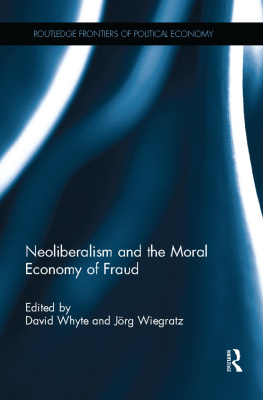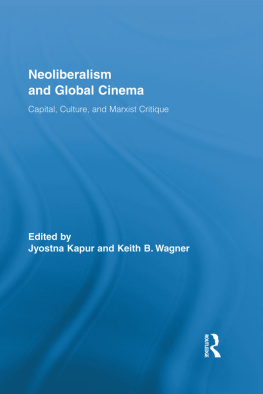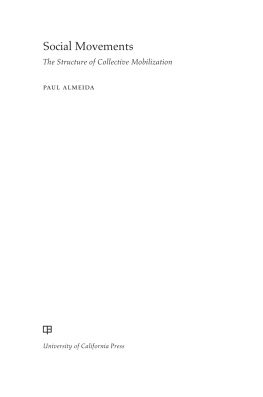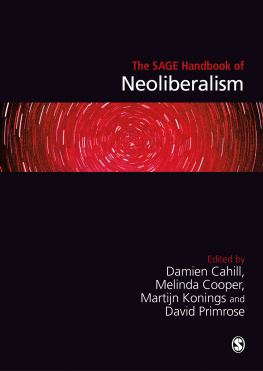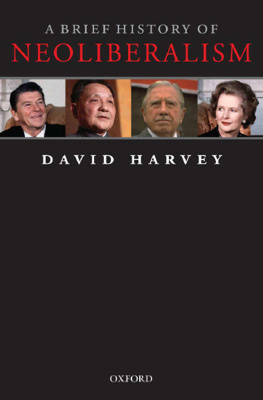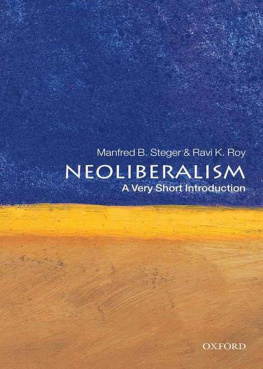We Make Our Own History
We Make Our
Own History
Marxism and Social Movements
in the Twilight of Neoliberalism
Laurence Cox and Alf Gunvald Nilsen

| PlutoPress
www.plutobooks.com |
First published 2014 by Pluto Press
345 Archway Road, London N6 5AA
www.plutobooks.com
Copyright Laurence Cox and Alf Gunvald Nilsen 2014
The right of Laurence Cox and Alf Gunvald Nilsen to be identified as the authors of this work has been asserted by them in accordance with the Copyright, Designs and Patents Act 1988.
British Library Cataloguing in Publication Data
A catalogue record for this book is available from the British Library
ISBN 978 0 7453 3482 0 Hardback
ISBN 978 0 7453 3481 3 Paperback
ISBN 978 1 7837 1190 1 PDF eBook
ISBN 978 1 7837 1192 5 Kindle eBook
ISBN 978 1 7837 1191 8 EPUB eBook
Library of Congress Cataloging in Publication Data applied for
This book is printed on paper suitable for recycling and made from fully managed and sustained forest sources. Logging, pulping and manufacturing processes are expected to conform to the environmental standards of the country of origin.
10 9 8 7 6 5 4 3 2 1
Typeset by Stanford DTP Services, Northampton, England
Text design by Melanie Patrick
Simultaneously printed digitally by CPI Antony Rowe, Chippenham, UK
and Edwards Bros in the United States of America
Contents
Preface: About This Book
Human beings make their own history, but they do not make it just as they please; they do not make it under self-selected circumstances, but under circumstances existing already, given and transmitted from the past.
Karl Marx, The Eighteenth Brumaire of Louis Bonaparte
We make our own history. Social movements know this: it is why we struggle, sometimes against seemingly overwhelming odds, to make a different world. It is hard to recognise in the present, which is one reason activists often read movement history and the biographies of earlier generations of organisers: looking back, it is far clearer just how much movements have shaped the world we live in. The end of monarchies and empires, freedoms of assembly and expression, wage raises and weekends, the development of welfare states, the end of fascism and apartheid, equal rights legislation, the legalisation of homosexuality, the fall of dictatorships, defeats of environmentally destructive projects, and so on: with all their geographical restrictions, practical limitations and disappointments, all the backlash and vitriol, social movements from below have shaped the modern world. They have not done so alone, but in conflict with massively powerful movements from above: successive forms of capitalist accumulation, new types of state and hegemony, racist mobilisations and patriarchal movements, new forms of common sense and brute force which have all attempted, often effectively, to reinforce existing structures of power, exploitation and sociocultural hierarchies.
Today, at this point in its complex history, neoliberalism a social movement from above that sought to restore profitability through market-oriented economic reforms pursued both against the popular gains that were institutionalised in state-centred forms of capitalist accumulation after 1945 in the global North and South, and against the movements of 1968 and after is facing ever-deeper crisis. With declining popular support, geopolitical reach and economic effectiveness, the neoliberal project is confronted with a growing wave of movements from below in much of the world. This book is written with the conviction that we need to understand both sides of this equation. If we see neoliberalism purely as system often with a dystopian or paranoid angle we fail to see that it, too, is a human product, often held together with duct tape and sailing on increasingly stormy waters. If we see our movements purely through the spectacles of celebration or disappointment, we fail to see what we can do to take them further.
We are living in the twilight of neoliberalism but not necessarily of capitalism. Movements from below have sustained a remarkably long cycle of resistance to neoliberalism, and may be in a position to shape what comes afterwards, in a way that they were not after the defeat of 1968 and the collapse of organized capitalism (see ). If we are not acting under circumstances of our own choosing, we none the less make our own history. Understanding how we do that and seeing the circumstances as the results of other peoples collective action is an important part of what can help us make our own history in a direction that is more in line with the needs expressed by our movements.
History of this Book
This book is the fruit of over a decade of joint work. As activists looking for understanding, perspectives and strategy on our own struggles, we became aware of each others work around a 2002 conference on social movements and the British Marxist historians, and realised that we were both working on the same problem from different angles. Alf, looking at rural struggles against dispossession in India, and Laurence, looking at anti-capitalist organising and working-class community activism in Ireland, saw the importance and potential power of a Marxist approach, but also the feebleness of existing Marxist theorisations of popular agency in relation to the situations we knew. All too often, the question What would a Marxist say about this? was not one to which we could find existing answers. At the same time, both Ireland and India were rife with institutionalised and state-centric forms of Marxism which relegated human beings making their own history to an unimportant back place, far behind the real concerns of economic theory and the desperate search for political parties to identify with, at home or abroad. We thought that another Marxism was possible.
By 200506, we had presented working versions of the chapters of this book to activist gatherings and social movement conferences and were busy contacting possible publishers: activist presses, left intellectual houses, university publishers and commercial academic presses. Between 2005 and 2009 we contacted 19 publishers, all of whom either turned it down, or failed to reply. The book provoked a serious division on one editorial board, and in another case convinced the editors that there was a need for a book on Marxism and social movements, but that this wasnt it.
Some publishers rejected the idea of a Marxist book as outdated by definition; others were committed to a different version of Marxism, autonomism or anarchism; others again felt that no-one would be interested in a Marxist reading of social movements and there the book languished, condemned to the gnawing criticism of the mice as two mightier authors once said. We turned our attention to making the case for serious reflection on Marxism and social movements, particularly the book of that name which we co-edited with British socialist Colin Barker and North American Marxist John Krinsky; to setting up the journal Interface, which develops dialogue between movement participants and activist researchers; and to our own writing on the Narmada movement in India and European social movements.
What a difference a recession makes.
With the rise of anti-austerity movements in Europe, movement-linked states in what was once the US backyard in Latin America, popular uprisings in the Arab world and Occupy in the Anglophone world, the connection between movement and inequality is once again visible to all. Books on movements proliferate, as do books on Marxism, though books which reflect on both remain rare. Over the last few years, Marxists have seen their own political organisations fall into (even further) disarray and Marxist celebrity has proliferated as a result, while at the same time the anarchist and autonomist perspectives dominant in many movements in the mid-2000s have found it hard to offer strategic ways forward beyond the ritual celebration of movements. We share that celebration in some ways; but to agree that we need movements, even movements independent of political parties, is not the end of a discussion but the start of one
Next page

